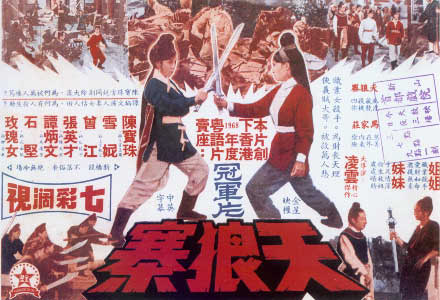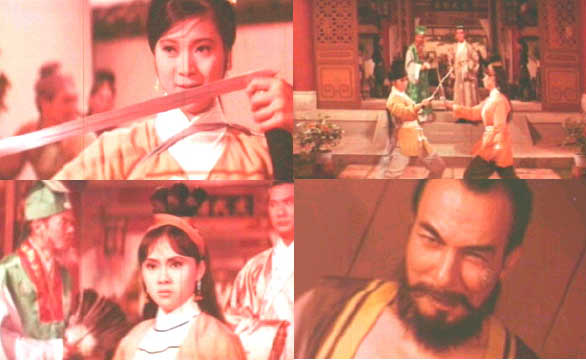Dragon Fortress (a.k.a.
The Tin-Long Gang)

(Picture from "Silver Light" by Paul Fonoroff)
Director: Ling Yun
Year: 1968
Rating: 7.0
The recent release
of many of the classic Shaw wuxia films of the 1960’s has allowed many of
these movies to be newly discovered and re-evaluated by modern audiences,
but during the same period there was an almost parallel cinema taking place
in Hong Kong that is still fairly obscure to most viewers. While the Shaw’s
are generally aligned with Mandarin cinema, there were also a number of film
companies making Cantonese films and the wuxia genre was an important component
of this. The Cantonese film industry for the most part had their own
set of directors and stars and at least until the Cantonese film scene began
to collapse in the early 1970’s these two didn’t intermix that much. Many
of these Cantonese stars were enormously popular such as Connie Chan Po-chu,
Josephine Siao, Patrick Tse and Wu Fung and these stars were cranking out
films at an incredible rate. In the year of this film, 1968, Chan Po-chu
was to make nearly 20 films but that was small change compared to her co-star
in this film, Kenneth Tsang who made around 25 films during the year.

This though was a problem. The films were being rushed to the theaters so
quickly that they tended to be much more poorly produced and with much smaller
budgets than their Mandarin equivalents and that is fairly evident in a film
such as this one. While many of the Mandarin wuxia films were very ornate
with huge sets and large casts the Cantonese films looked extremely underfed
by comparison. This disparity in production values led to the increasing popularity
of the Mandarin films and the rapid decline of the Cantonese industry and
the near disappearance of many of their stars from the screen. Interestingly,
many of the fight choreographers originated in the Cantonese industry but
eventually were enticed to work for Shaw. The two best known are Lau Kar-leung
and his partner Tong Kai who worked often with Ling Wan, the director of this
film. From the mid-60’s on Ling directed many wuxia films – often scripted
by Szeto On – with perhaps his best known being the series of films called
“Buddha’s Palm”. Though much of “Dragon Fortress” looks low budget, the
action choreography is surprisingly solid with good use made of wires and
trampolines and it is also surprisingly bloody.

Shang Kuan (Chan Po-chu) is surrounded by a group of men who mistake her
for the “Pitiless Sword” whom they are attempting to find and do bodily damage
to, but Chan quickly dispatches them and sends them running off. She too is
looking for the “Pitiless Sword” and soon finds her at the household of Squire
Ma (Tam Bing Man) where she is applying for a job that Ma has posted. He
is looking for a few good swordsmen to fight their way into the hideout of
Scar Face Wolf (Sek Kin) who has kidnapped his wife and to bring her back.
Living up to her nickname, “Pitiless Sword” (Suet Nei) has a perpetual scowl
painted on her face and contemptuously tells her fellow applicants to scram
and when they hesitate takes a sword to them. At this point Shang Kuan makes
an appearance and gladly joins in the fracas to send the men scurrying off
before she and “Pitiless” are soon at sword point with one another. Ma though
convinces them to work together to get his wife back.

The two women soon enlist two men to assist them – Chin Tien-we (played
by Cheung Ying-choi – nicknamed for mysterious reasons in real life as “handsome
young man”) and his roguish friend Dih Lung-tsi (Kenneth Tsang) who is pretty
handy with phony dice as well as a sword. Dih is also a complete mercenary
and wants to be paid by the kill – and after they refuse he soon has the opportunity
to show them how good he is by killing a number of Scar Face’s men who try
and stop them – he tells them those eleven were free of charge but no more.
They take him on. There is a little melodrama mixed in – Chin has a crush
on “Pitiless Sword” that is certainly not based on her smile, but she cares
only for the reward they will get for killing Scar Face and saving the wife.
This avariciousness it turns out has a history – she and Shang are half-sisters
and Shang’s mother treated Pitiless so badly that she ran away from home
and swore to get rich – by killing. They slowly work their way into Scar’s
home turf leaving many bodies in their wake but an interesting twist awaits
them that turns the plot on its head and forces them to re-evaluate their
mission and their mercenary ways.

The film is fairly enjoyable as it moves at a quick pace and has a fight
scene thrown in on a regular basis. With a bigger budget this certainly would
have been the equal of many of the Shaw wuxia’s from the same period. The
presentation doesn’t help much – though the vcd is widescreen, the print source
is quite poor and there are a number of rapid edits that I would guess are
due to missing bits rather than to poor editing. The vcd does have sub-titles
though which is still quite rare for these early Cantonese films. The actors
are more than just fine as well. Connie Chan Po-chu was of course one of the
biggest stars in Hong Kong at the time and her background in martial arts
– taught to her by her parents – is put to good use as she gracefully dispatches
attackers. Suet Nei was another Cantonese female action star at the time
and in a short period was to appear in many wuxia films before she retired
at the young age of 24 to marry none other than choreographer Tong Kai (she
later was to return to television). Most interesting though is Kenneth Tsang
who was Jeanette Lin’s brother. His acting feels so modern in some ways –
very casual and real and lacking in the stiffness that so many of the male
hero’s possessed at the time and he gives the film a real jolt of energy
and personality.







